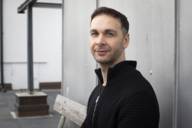
Munich is home to many writers who foster a very special connection to their city. Our author wants to find out what influence Munich has on their work. Pierre Jarawan takes us to Autorenbuchhandlung bookshop in Schwabing and to the Volkssternwarte (observatory), where he is currently doing research for his third novel.
He has already stood on stage in front of over 1000 people, reciting texts as a poetry slammer. Today, Pierre Jarawan is the bestselling author of two novels that have been translated into several languages. In an interview, he talks about his work and what he particularly likes about Munich.
We are sitting in the back of the Autorenbuchhandlung bookshop in the Schwabing district, surrounded by children's books; on the opposite wall hangs a portrait of the young Paul Auster – a signed one, as we find out later. Pierre Jarawan suggested we meet in this bookshop, which is celebrating its 50th anniversary this year. “I like the personal touch here”, he says. “Young authors are promoted and the bookshop also keeps an eye on who is publishing in Munich. I don't just come here to buy a book, but also to have a quick chat.”
Karin Staisch, the bookshop manager, sits down with us and tells us that the focus of the selection is on long-lasting, high-quality literature. So, Jarawan's stories fit the bill. The author, son of a Lebanese father and a German mother, came to Munich at the age of three. In his novels, he addresses the complex history of Lebanon and interweaves fiction with historical facts, such as the impact of the Arab Spring and the civil war in the country. “I appreciate the diversity in his books,“ Staisch says. “When you get to the end and realise the origin of the red threads and how Pierre finally put them together: that's ingenious art.“
And art has many faces. Before Pierre Jarawan became a writer, his realm was poetry slam – he even won the German championship title in 2012. This is a poetry competition in which previously written texts are recited to the audience. “There are three rules to follow”, he explains. “You have to write the text yourself and perform it within a time limit of six minutes. You are also not allowed to use any props. In the end, the audience decides who wins.” I ask him if it was easy for him to trade the big stage for the quiet study, to which he replies that he is grateful for this career path. “Being a full-time pro was extremely draining. To make a living at it, I did over 100 gigs a year, plus gave various workshops.“ Today he moderates the Isar Slam in Munich, but mainly sits at his desk at home in Schwabing and devotes himself to his books.
"Bright lights, throbbing sounds. Beirut by night, a sparkling beauty, a twinkling tiara, a breathless trail of flickering lights." This is the opening phrase of his first novel, “The Storyteller“, which was awarded the Literature Scholarship of the City of Munich. It is a novel that makes readers sense the inner turmoil of the country and at the same time deeply involves them through the tender, poetic language. “The nicest compliment on the first book was that people, who didn't know Lebanon at all, flew there. They sent me photos of the locations, while holding the book in their hand.”
I ask him, how he manages to write about Lebanon in tranquil Munich. Is he an outside observer or does he get involved in the story? “I try to let the emotions in, because I think that makes the text stronger. It's not always easy and sometimes it gets too much for me, but I think it's good to let yourself be overwhelmed.” The best place for him to relax is the Englischer Garten, whose entrance is just around the corner from his apartment. Otherwise, incidentally, you can meet him in the Staatsbibliothek – “a huge treasure, I find the most offbeat books here“ – or in the Arab supermarkets on Landwehrstrasse in search of unusual spices and pita bread. Lately, however, he has also been in a place that seems rather unexpected at first glance: the Munich Volkssternwarte (observatory), where he is doing research for his current novel.
For more than 70 years it has stood on the edge of what is now the Werksviertel, and this once modest venture has established itself as a registered association and as one of the most important German observatories. Björn Wirtjes welcomes us and shows us the great view over Munich from the roof. “This is a listed high bunker. It's a stable building, nothing wobbles. That's why it is so suitable for setting up telescopes.“ Because the sky is overcast, he sets up one of the devices for us to see Wendelstein mountain, just for the fun of it. On this mountain that forms part of the Bavarian Alps, there is another observatory, namely that of Munich's Ludwig-Maximilian-Universität. So we can give a quick wave to the colleagues.
Then we take a seat in the planetarium, where an old Zeiss device casts the planetary constellations onto the ceiling – a night sky that turns from dark blue to pink. When the sun rises again, I catch a glimpse of Jarawan's ardent face. Even though his third novel is also set in the Middle East, the research in the Volkssternwarte observatory is a crucial jigsaw piece of the big picture. A little piece of Munich in Lebanon, so to speak.
On the way home, I ask the author, who has lived here since 2012, what he likes about Munich. “I just fell in love with the city and with the woman I'm married to now. I liked the place right from the start. Through my slam trips I got to know many cities and I have to say: There's no other place like here.“